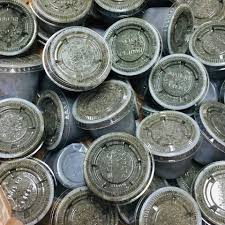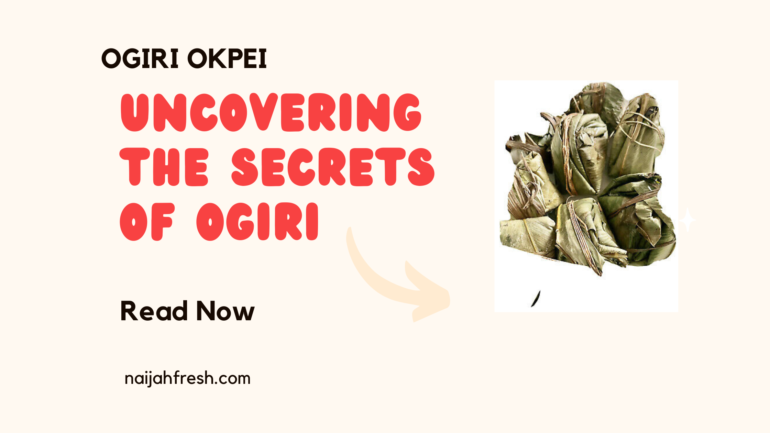
What is Ogiri?
Ogiri is a traditional Nigerian condiment made from fermented locust beans that has a salty and slightly bitter taste. It is an important part of Nigerian cuisine and culture and is often served on special occasions. Ogiri gives dishes an unmistakable umami flavor and is commonly used as a condiment with fish, poultry, pork, beef, and vegetables. It is used in a wide range of Nigerian dishes, including stews, soups, and sauces.
Ogiri is traditionally made in clay pots, but can also be made in plastic containers. The fermentation process of Ogiri is what gives it its unique flavor and aroma. To make Ogiri, the locust beans are soaked in water for a few days and then ground. The ground beans are then mixed with salt and placed into a container. The container is then left to ferment for several days, depending on the desired intensity of flavor.
Ogiri is an important part of Nigerian cuisine and culture and can be used to add flavor to many dishes. It can be used to enhance the flavor of meats and vegetables, or as a condiment to accompany meals. Whether it’s served on special occasions or as part of a regular meal, Ogiri’s unique taste is sure to be appreciated.
However, when Ogiri is subjected to a study from the report of the medical Journal to ascertain the levels of the levels of aflatoxins, it was found out the level is above the required level acceptable by the National Agency for Food and Drug Administration and Control (NAFDAC).
What are the Primary Ingredients Used to Make Ogiri?
Ogiri is a traditional Nigerian condiment made from a variety of ingredients and is used to enhance the flavor of many dishes. The primary ingredients used to make ogiri are oil seeds, fermented locust beans, and crayfish, which combine to make a unique and delicious condiment. Oil seeds such as melon, sesame, or castor are used to provide a rich nutty flavor and aroma to the ogiri, while fermented locust beans, also known as iru, provide a pungent and salty flavor. Crayfish are often used to give ogiri its characteristic reddish-brown color and a slightly fishy flavor. Other ingredients such as onions, peppers, and spices are used to add additional flavor and texture to ogiri.
This traditional condiment is the perfect addition to many Nigerian dishes, adding a unique flavor and texture. Ogiri is often used as a topping for soups and stews, and is also a popular ingredient in sauces, marinades, and dressings. It is also used as a base for many Nigerian dishes, providing a flavorful foundation for traditional recipes.
Whether you’re looking for a condiment to add a unique flavor to your dishes or a base for your favorite Nigerian recipes, ogiri is an excellent choice. With its combination of oil seeds, fermented locust beans, crayfish, and other ingredients, ogiri is sure to add a unique flavor and texture to your favorite dishes.
Types of Ogiri
Ogiri is a traditional Nigerian dish made from ground melon seeds, beans, fish, palm oil, and okpei, a type of fermented bean paste. It is a popular side dish served with boiled or roasted plantains and yams. Ogiri is a tasty and nutritious dish that is full of flavor and texture.
Ground Ogiri is the most common type of ogiri. It is made with ground melon seeds, onions, and spices. This type of ogiri is typically served with boiled or roasted plantains. Bean Ogiri is another popular type of ogiri. It is made from beans, such as black-eyed peas, and spices. This type of ogiri is usually served as a side dish with rice.
Fish Ogiri is also a popular type of ogiri. It is made with fish, onions, and spices and is usually served with boiled plantains or yams. Palm Ogiri is also a type of ogiri that is made with palm oil, onions, and spices. It is usually served with boiled plantains or yams. The last type of ogiri is Ogiri Okpei. This type of ogiri is made with okpei, a type of fermented bean paste, onions, and spices. It is often served with boiled plantains or yams.
Ogiri is an incredibly versatile dish that can be adapted to suit any taste. It is a great way to add flavor and nutrition to any meal. Whether you are looking for a side dish to accompany a meal or a delicious snack to enjoy, ogiri is a great choice.
Are there any health benefits associated with consuming Ogiri?
Ogiri is not only delicious but also has many health benefits.
Studies have shown that consuming ogiri can provide numerous health benefits, including improved digestion. The melon seed contains high levels of fiber which helps to keep your digestive system healthy and working properly. Ogiri also boosts energy levels due to its high protein content. Additionally, ogiri has anti-inflammatory properties which can help to reduce inflammation. It also contains unsaturated fatty acids which can help reduce bad cholesterol levels. Last but not least, ogiri is packed with vitamins and minerals which give your immune system a much-needed boost.
In addition to its health benefits, ogiri is also a great way to add flavor to dishes. Try adding it to soups, stews, or even salads for an added kick of flavor. Ogiri is a versatile condiment that can be used in many different ways to add flavor and provide health benefits.
What is the difference between Ogiri and Ogiri okpei?
Ogiri is a traditional Nigerian condiment made from a variety of fermented seeds, such as melon, sesame, and peanut. It is often used as a flavoring for soups and stews, adding a savory and slightly tangy flavor to the dish.
Ogiri okpei is a special type of ogiri made from okpei, a type of seed found in West Africa. This version of ogiri is darker in color and has a slightly smoky flavor, making it the perfect accompaniment to a variety of dishes. Ogiri okpei is more commonly used as a condiment to be eaten directly, rather than as a flavoring for soups and stews.
The difference between regular ogiri and ogiri okpei lies in the type of seed used to make the condiment. While ogiri is usually made from a mix of different seeds, ogiri okpei is made from okpei alone. As a result, ogiri okpei has a more intense flavor than regular ogiri, and is often added to dishes to add a smoky flavor.
Whether you prefer the mild taste of regular ogiri or the smoky flavor of ogiri okpei, this traditional Nigerian condiment is sure to add an extra layer of flavor to any dish.
How to prepare ogiri
Ogiri is a traditional Nigerian dish that is packed with flavor and nutrition. To make Ogiri, you’ll need to gather the necessary ingredients such as African oil beans, crayfish, dried fish, pepper, palm oil, salt, and onions. Begin by soaking the African oil bean in water for several hours, then grind it into a paste. Heat the palm oil in a large pot and add the ground African oil bean paste. Fry the crayfish, dried fish, pepper, and onions in the pot until they are fully cooked. Add the salt to taste, stirring the mixture continuously until it reaches the desired consistency. Serve the Ogiri as a side dish with rice, plantains, or other starchy foods. Ogiri is a delicious and nutritious dish that can be enjoyed by all.


